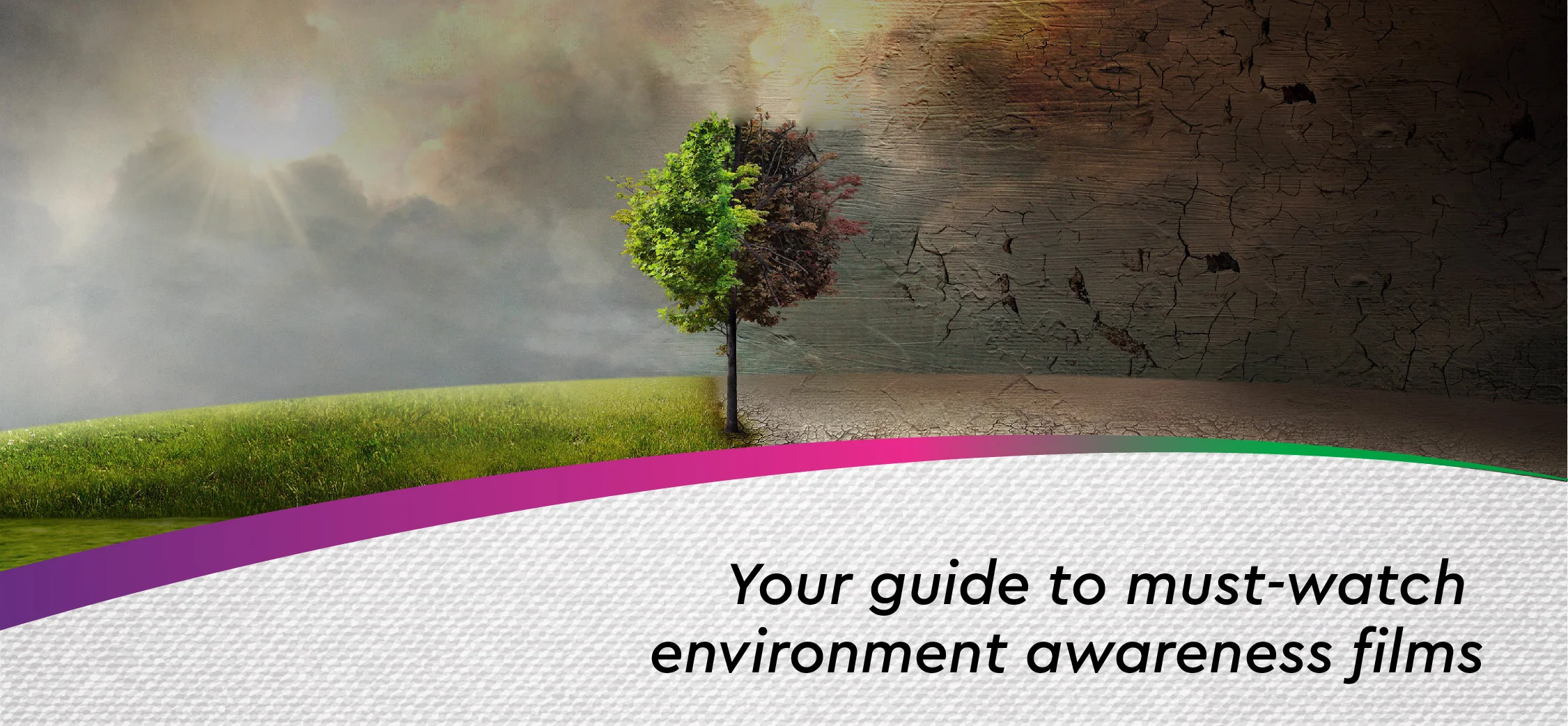
In the entertainment industry, the power of films extends beyond entertainment—they serve as influential tools for raising awareness on crucial issues. One of the most pressing concerns of our time is the state of the environment. This article explores the significance of films in promoting environmental awareness and delves into notable productions that have contributed to this cause.
Power of Films in Raising Awareness:
Films possess a unique ability to capture audiences’ attention and evoke emotions, making them powerful instruments for delivering impactful messages. Environmental awareness, in particular, has found a compelling platform in cinema. Through storytelling, visuals, and narratives, films can effectively communicate complex issues, fostering a deeper understanding and connection with global challenges.
Importance of Environmental Awareness:
In today’s world, where environmental issues pose imminent threats, awareness becomes a crucial catalyst for change. Understanding the consequences of climate change, pollution, and unsustainable practices empowers individuals and communities to make informed decisions that contribute to a more sustainable future. Films that shed light on environmental concerns play a pivotal role in shaping public consciousness and driving collective action.
Section 1: Top Environment Awareness Films:
1. An Inconvenient Truth (2006):
“An Inconvenient Truth,” directed by Davis Guggenheim and featuring former Vice President Al Gore, stands as a landmark documentary that brought the critical issue of climate change to the forefront of global consciousness. Released in 2006, the film utilizes compelling visuals, scientific data, and Gore’s impassioned narration to present the alarming realities of climate change.
Key takeaways from Al Gore’s documentary:
- Greenhouse Gas Emissions:
Gore outlines the role of human activities, particularly the burning of fossil fuels, in the significant increase of greenhouse gas emissions.
- Melting Ice and Rising Sea Levels:
Visual evidence illustrates the rapid melting of glaciers and the potential consequences of rising sea levels for coastal areas.
- Extreme Weather Events:
The film links climate change to an increase in extreme weather events, emphasizing the urgency of addressing the issue.
2. Before the Flood (2016):
“Before the Flood,” a documentary produced and narrated by Leonardo DiCaprio, follows the actor and environmental activist as he travels the world to witness the impacts of climate change. Released in 2016, the film provides a comprehensive exploration of the global consequences of climate change, examining deforestation, carbon emissions, and the role of corporations and governments.
DiCaprio’s documentary communicates the urgency of addressing climate change through:
- Global Perspectives:
The film captures firsthand experiences from diverse regions, showcasing the varied impacts of climate change on communities and ecosystems.
- Expert Interviews:
Insights from scientists, environmentalists, and world leaders contribute to the film’s credibility and underscore the need for immediate action.
3. The True Cost (2015):
“The True Cost” dives into the fashion industry’s ecological footprint, shedding light on the environmental degradation caused by fast fashion. Directed by Andrew Morgan, the documentary explores the consequences of mass production, textile waste, and the exploitation of workers in the global fashion supply chain.
The film prompts viewers to reconsider their consumer habits by emphasizing-
- Fast Fashion Pitfalls:
The documentary reveals the environmental and social costs of the rapid turnover of fashion trends.
- Sustainable Alternatives:
It advocates for ethical and sustainable fashion choices, encouraging consumers to make informed decisions about their clothing purchases.
4. A Plastic Ocean (2016):
Directed by Craig Leeson, “A Plastic Ocean” exposes the pervasive issue of plastic pollution in Earth’s oceans. The film documents the impact on marine life, and ecosystems, and the potential consequences for human health.
The documentary motivates audiences to take action by:
- Raising Awareness:
The film educates viewers about the scale of plastic pollution and its far-reaching consequences.
- Individual Responsibility:
It emphasizes the role of individuals in reducing plastic use and advocates for sustainable practices.
- Industry Accountability:
The documentary calls for corporate responsibility in reducing plastic production and promoting eco-friendly alternatives.
5. Waste Land (2010):
“Waste Land” directed by Lucy Walker follows artist Vik Muniz as he collaborates with garbage pickers in Rio de Janeiro to create transformative works of art. The film showcases the dignity and resilience of those working in challenging conditions.
The documentary highlights:
- Social Impact:
Muniz’s art project brings attention to the lives of the garbage pickers, fostering a sense of community and empowerment.
- Art as Advocacy:
“Waste Land” explores how art can be a powerful tool for raising awareness and instigating positive change.
- Environmental Advocacy:
The film indirectly advocates for sustainable waste management and the importance of addressing social and environmental issues through creative means.
Section 2: Impactful Documentaries on Conservation:
1. Rotten (2018):
“Rotten” is a documentary series that scrutinizes the intricacies of the global food industry. Each episode investigates different aspects, shedding light on issues like illegal fishing, fraud in the honey trade, and the environmental consequences of the avocado industry.
The series encourages viewers to think about their food choices by:
- Unveiling Industry Realities:
“Rotten” reveals hidden truths within the food industry, prompting discussions on ethical consumption.
- Advocating for Sustainability:
It emphasizes the importance of supporting sustainable and ethical practices in food production and distribution.
2. Our Planet (2019):
“Our Planet” is a collaboration between Netflix and the World Wildlife Fund (WWF), offering a breathtaking exploration of Earth’s diverse ecosystems. The series utilizes cutting-edge technology to capture the beauty of wildlife.
The documentary promotes environmental awareness by:
- Showcasing Biodiversity:
“Our Planet” highlights the rich biodiversity of Earth, emphasizing the importance of conservation to preserve these ecosystems.
- Educating Audiences:
It educates viewers on the impact of human activities on wildlife and the urgent need for global conservation efforts.
3. The Ivory Game (2016):
Directed by Kief Davidson and Richard Ladkani, “The Ivory Game” is an intense exposé on the illegal ivory trade, revealing its devastating consequences on elephant populations across Africa and Asia.
The documentary advocates for wildlife conservation by:
- Raising Awareness:
It exposes the harsh realities of the ivory trade, mobilizing support for efforts to protect endangered species.
- Promoting Anti-Poaching Measures:
“The Ivory Game” underscores the importance of anti-poaching initiatives and stricter regulations to combat illegal wildlife trade.
4. Chasing Ice (2012):
“Chasing Ice” follows photographer James Balog as he captures the dramatic effects of climate change on glaciers through his Extreme Ice Survey.
The documentary contributes to climate change discussions by:
- Visual Evidence: Balog’s photographic evidence documents the alarming rate at which glaciers are melting.
- Impactful Storytelling: “Chasing Ice” engages audiences emotionally, emphasizing the urgency of addressing climate change and its consequences.
Section 3: Galalite’s Contribution to Sustainable Cinema:
1. Introduction to Galalite:
Galalite, established in 1959 by Mr. Yusuf A. Galabhaiwala, has evolved into a pioneering cinema screen manufacturer. Originating as a small family business, Galalite is now in its third generation, boasting substantial production facilities and a legacy of innovation. The company, based in Mumbai, has been at the forefront of the industry, introducing advancements like water-based coating, Lensray technology & implementing invisible welding techniques.
2. Commitment to Sustainability:
Galalite’s commitment to sustainability is evident through various initiatives aimed at minimizing its carbon footprint. As a responsible corporate entity, Galalite:
- Adopts Green Practices:
Actively integrates eco-friendly practices into its manufacturing processes, reducing environmental impact.
- Invests in Research:
Supports research and development for greener technologies within the cinema screen manufacturing domain.
- Zero Emission Brand:
Galalite Screens in 2023 proudly declared itself a zero-emission brand, embracing a commitment to minimizing its ecological footprint. This signifies a holistic approach to environmental responsibility, touching every aspect of the business, from manufacturing practices to overall corporate policies.
- Birthday Tree Planting Tradition:
In a unique and thoughtful initiative, Galalite goes beyond its immediate environmental impact. For every customer’s birthday, the company plants a tree on their behalf. This symbolic gesture not only celebrates the customer but also contributes to the larger mission of reforestation and environmental conservation.
3. Innovation in Technology:
Galalite’s contributions extend beyond traditional cinema screen manufacturing. The company has played a pivotal role in reshaping the industry through:
- Lensray Technology:
Introduced in 2018, this innovation redefines picture quality for enhanced viewing while minimizing stress on viewers’ eyes by reducing the speckle caused by laser projectors. The technology aligns with Galalite’s commitment to delivering quality experiences.
Conclusion:
In a world aware of environmental challenges, the role of cinema in raising awareness is crucial. Environmental awareness films greatly contribute to this cause. By supporting sustainable cinema, individuals contribute to a collective effort for a greener, more responsible film industry.
Galalite invites readers to be mindful consumers and advocates for sustainable cinema. By supporting environmentally conscious initiatives within the entertainment industry, individuals can contribute to a more sustainable future. Let’s embrace the power of cinema not only as a source of entertainment but as a platform for positive change.
FAQ’s
What are environmental awareness films?
Environmental awareness films highlight critical issues related to nature, climate change, sustainability, and conservation, encouraging action for a healthier planet.
Why are environmental awareness films important?
These films educate and inspire audiences to take responsibility for the environment, promoting eco-friendly practices and a sustainable future.
Can environmental awareness films be entertaining?
Yes, many environmental films combine compelling storytelling with important messages, making them both informative and entertaining.
What are some must-watch environmental awareness films?
Films like An Inconvenient Truth, The True Cost, and Our Planet are widely regarded for raising awareness and sparking environmental change.
How can environmental films influence society?
Environmental films can shape public opinion, spark global conversations, and inspire individuals, organizations, and governments to prioritize sustainability.
Related articles



